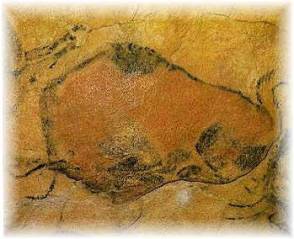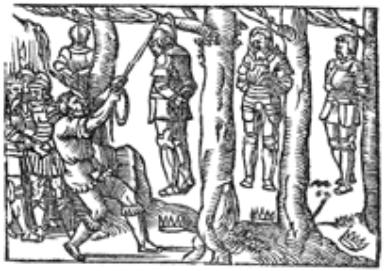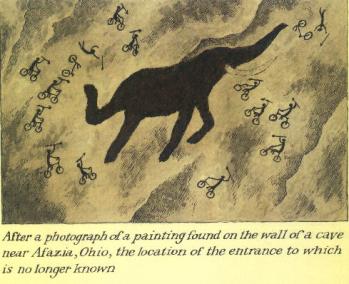
THERE IS HOPE FOR CAVEMEN

c.2005
by
John W. Cowart
The Holy Bible says quite a lot about cavemen
By definition a caveman is a person who lives in a cave.
The purpose of this article is to show from the Scripture that there is hope for cavemen.
This hope needs to be demonstrated because to be a caveman is a terribly depressing state for anyone.
Caves are dark, full of shadows, and inhabited by bats, roaches, lizards and other vermin. No one should have to live in a cave, but for a caveman this dreary habitation represents his final refuge from a hostile world. While caves make wonderful places to explore on an adventurous vacation, they are sad depressing refuges from trouble – not a luxury resort but a last resort.
At some time or another most of us want to crawl into a hole and pull it in after us. Troubles get so overwhelming that we yearn to withdraw from other human society and hide in a cave.
Few of us actually do this, but occasionally the Scriptures relate the story of a real caveman – a man who hides in caves to escape some horrible circumstance of the outside world.
For instance, the first caveman mentioned in Scripture was named Lot. His sad, sordid story is told in the first book of the Bible:
Lot and his two grown daughters survived one of the greatest catastrophes in biblical history. Lot’s wife (remember her?) did not survive. Hardly anyone did.
“The Lord rained upon Sodom and upon Gomorrah brimstone and fire from the Lord out of heaven; and He overthrew these cities, and all the plain, and all the inhabitants of the cities, and that which grew upon the ground… Lo, the smoke of the country went up as the smoke of a furnace”.
Overnight Lot degenerated from being a prosperous, respected city leader to becoming a homeless refugee.

In 1498 Albrecht Durer painted Lot’s escape.
The three shell-shocked, dazed survivors stumbled through the desert seeking a fall-out shelter. “And Lot went up… and dwelt in the mountain, and his two daughters with him… and he dwelt in a cave, he and his two daughters”.
Now the story gets sordid.
Perhaps the trio suffered post-traumatic stress syndrome, perhaps they felt that desperate circumstances call for desperate measures, perhaps they just gave up hope. Who knows? At any rate, there in the cave they got drunk. The Bible says that Lot was too drunk to perceive anything going on; he didn’t know what he was doing – but he managed to do it anyhow. He got both of his own daughters pregnant.

Lot & daughters in the cave, painted by Metsys (1509-1575)
“Thus were both the daughters of Lot with child by their father. And the firstborn bare a son, and called his name Moab: the same is the father of the Moabites unto this day. And the younger, she also bare a son, and called his name Ben-am’mi; the same is father of the children of Ammon unto this day”.
Thus in while dwelling in a mountain cave, a caveman and two cavewomen originated the Moabites and Ammonites, enemies of God’s people all through biblical history.

In 1530, Dutch painter Lucas Van Leyden portrayed daily life in Lot’s cave.
Looks as though we can write Lot off, doesn’t it? Here he is; a homeless bum living in a squalid cave, laying around drunk, diddling his daughters in nightly threesomes.
A depressing sight.
But oddly enough, the Scripture does not write off Lot, or anyone like him, as a looser.
Quite the contrary.
In Deuteronomy Moses said, “The Lord said to me, Distress not the Moabites, neither contend with them in battle… because I have given (the land of) Ar unto the children of Lot… And when thou comest nigh over against the children of Ammon, distress them not, nor meddle with them… because I have given (a land) unto the children of Lot for a possession”.
Here God is standing up for the descendents of drunken Lot’s incestuous shenanigans in the cave.
And when the Son of God wanted to  illustrate conditions surrounding his own coming in glory at the end of the age, Jesus chose Lot as his example:
illustrate conditions surrounding his own coming in glory at the end of the age, Jesus chose Lot as his example:
“As it was in the days of Lot; they did eat, they drank, they bought, they sold, they planted, they builded; but the same day that Lot went out of Sodom, it rained fire and brimstone from Heaven, and destroyed them all. Even thus shall it be in the day when the Son of man is revealed”.
In Peter’s second letter he too uses Lot as an example of righteousness!
God “turning the cities of Sodom and Gomorrah into ashes condemned them with an overthrow, making them an ensample unto those that after should live ungodly; and delivered just Lot, vexed with the filthy conversation of the wicked: (For that righteous man dwelling among them, in seeing and hearing, vexed his righteous soul from day to day with their unlawful deeds); The Lord knoweth how to deliver the godly out of temptations and to reserve the unjust unto the day of judgment to be punished”.
Notice the terms Peter uses to describe Lot – “just Lot… righteous man… righteous soul… godly”
My point here is that the Bible teaches that God does not condemn us on the basis of isolated incidents we have done, no matter how squalid; He judges us all, even when we sometimes act like troglodytes, on the overall tone of our lives.
In other words, Lot’s story shows that there is hope for cavemen.
 The Bible tells of many people who, in times of trouble, became cavedwellers; here are three incidences:
The Bible tells of many people who, in times of trouble, became cavedwellers; here are three incidences:
”And the hand of Midian prevailed against Israel: and because of the Midianites the children of Israel made them the dens which are in the mountains, and caves, and strong holds”. (Judges 6:2)
”When the men of Israel saw that they were in a strait, (for the people were distressed,) then the people did hide themselves in caves, and in thickets, and in rocks, and in high places, and in pits” (I Samuel 13:6).
“Now Obadiah feared the LORD greatly: For it was so, when Jezebel cut off the prophets of the LORD, that Obadiah took an hundred prophets, and hid them by fifty in a cave, and fed them with bread and water“ – (I Kings 18:3)
But hiding in a cave didn’t always help.
Five heathen kings allied themselves to fight against Joshua and the children of Israel. They marched off to war but when the battle turned against them, the five deserted their troops in the field and hid in a cave at a place called Makkedah.
But, tough luck, some Israeli soldiers saw them go into the cave.
They told Joshua, who said, “Roll great stones upon the mouth of the cave, and set men by it for to keep them:”.
He ordered his troops to leave the kings in the cave and keep fighting the heathen. He said, “Pursue after your enemies, and smite the hindmost of them; suffer them not to enter into their cities: for the LORD your God hath delivered them into your hand”.
“And it came to pass, when Joshua and the children of Israel had made an end of slaying them with a very great slaughter, till they were consumed, that the rest which remained of them entered into fenced cities…

Then Joshua said, “Open the mouth of the cave,
and bring out those five kings unto me out of the cave”…
The Bible then says, “And it came to pass, when they brought out those kings unto Joshua, that Joshua called for all the men of Israel, and said unto the captains of the men of war which went with him, Come near, put your feet upon the necks of these kings. And they came near, and put their feet upon the necks of them.
“And Joshua said unto them, Fear not, nor be dismayed, be strong and of good courage: for thus shall the LORD do to all your enemies against whom ye fight”.
“And afterward Joshua smote them, and slew them, and hanged them on five trees: and they were hanging upon the trees until the evening. And it came to pass at the time of the going down of the sun, that Joshua commanded, and they took them down off the trees, and cast them into the cave wherein they had been hid, and laid great stones in the cave's mouth, which remain until this very day”.

Stomp their heads, smite ‘em, slay ‘em, hang ‘em, and throw ‘em in a hole.
In those days, that was what they called meaningful dialog.
Another caveman the Bible tells about was the prophet Elijah.
Oddly enough, while Lot fell into the cave of depression after a great catastrophe, Elijah ended up in the cave after a great triumph. He’d just seen God in a blaze of glory use him to defeat 400 devotees of Baal but immediately afterwards he felt so utterly down that he despaired.
Yes, this is the same man who later on would be taken visibly into Heaven in a chariot of fire drawn by flaming horses but first he spent some time dwelling in a cave. Elijah was a man of great victories and of great depressions. And the Scripture describes him as “a man subject to like passions as we are”.
A day or so after the victory over Baal worshipers, when wicked queen Jezebel threatened to kill him, Elijah fell into a state of near suicidal depression and ran for cover. Enough is enough, he said.
“He himself went a day’s journey into the wilderness and came and sat down under a juniper tree: and he requested for himself that he might die; and said, It is enough; now, O Lord, take away my life; for I am not better than my fathers”.
The Bible says that an angel touched him twice and encouraged him to travel onward to Mount Horeb: “And he came thither unto a cave, and lodged there”.

In this cave the prophet sulked.
He spoke of being isolated, alone, fearful; he questioned the value of his life and ministry.
From the mouth of his cave he saw a whirlwind in the desert. He felt an earthquake. He saw a forest fire
And the Lord was not in the whirlwind, the earthquake or the fire.
But after the fire came a still small voice, a delicate whispering as of the breeze among leaves.
Twice while the caveman prophet sulked the Word of the Lord came to him and both times asked the same question:
“What doest thou here, Elijah”?
Yes indeed, why would God’s man be a caveman?
Although he was the slayer of the giant, the sweet psalmist of Israel, the king of the nation, and a man after God’s own heart, David was also a caveman.
On several occasions troubles forced David to live in a cave – where he was miserable.
The Hebrew superscription to Psalm 142 reads, “Maschil of David; a prayer when he was in the cave”. The Psalm reveals how depressing it is to be confined to a cave; this written prayer reveals David’s feelings as he complains to God about his troubles:
*****************************
I cried unto the LORD with my voice;
with my voice unto the LORD did I make my supplication.
I poured out my complaint before Him;
I shewed before Him my trouble
When my spirit was overwhelmed within me,
then Thou knewest my path.
In the way wherein I walked have they privily laid a snare for me.
I looked on my right hand, and beheld,
but there was no man that would know me:
Refuge failed me; no man cared for my soul.
I cried unto Thee, O LORD:
I said, Thou art my refuge and my portion in the land of the living.
Attend unto my cry; for I am brought very low:
deliver me from my persecutors; for they are stronger than I.
Bring my soul out of prison, that I may praise Thy name:
the righteous shall compass me about;
for Thou shalt deal bountifully with me.
**************************
David’s spirit is overwhelmed.
He is brought very low.
He says, “refuge failed me”.
He expresses his depression and feeling of rejection saying, “there was no man that would know me… no man would care for my soul”.
David says that it’s no fun to be a caveman.
Over the centuries many men of God have known exactly how David felt. Jeremiah was familiar with this state of mind. David Brainerd, a man of God who was a key to the Great Revival of the early 1700s, seems morose and melancholy in his journal. Adoniram Judson, missionary to Berma, actually dug his own grave and sat staring into it for hours each day meditating on how his body would decompose and be eaten by worms.
Yes, many great men of God have know depression and have learned, like David, how to handle it to God’s glory. There is hope for those confined in the cave of depression.
David’s depression as expressed in Psalm 142, was real – but how did he get to be a caveman?
He was the youngest of eight brothers. Having seven big brothers to boss him around must have made for a depressing childhood, but he survived that trauma. His brothers joined King Saul’s army fighting the Philistines.
When David arrived at the battle (I Samuel 17) and offered to fight the giant Goliath, his oldest brother belittled him in front of all the soldiers accusing him of being vain and haughty.
And David said, “What have I done now”!
Then, as now, family squabbles and tensions were depressing.
After David killed the giant, envy and jealousy consumed King Saul.
To escape Saul’s wrath, David, the Hero of Israel, and his wife, Michal, devised a plan.
While David crept out a rear window of his home, Michal placed a dummy made out of an image and a goat-hair pillow in the bed and told the soldiers that her husband was deathly ill.
After escaping from Saul, David fled to the court of Achish, King of Gath. There David pretended to be mentally unbalanced, letting the spittle drool down his beard and scratching himself against the doorposts.
It gets worse.
From Gath David went to live in a cave named Adullam, where he wrote Psalm 142.

A cave at Adullam where David may have lived and written Psalm 142.
Thus the “man after God’s own heart” became a caveman.
In Adullam Cave David had valid reasons for his state of depression. Trouble frustrated his personal plans and ambitions. Michal – the same wife who’d helped him escape – separated and re-married another man. Whereas he’d once been a rising young man prominent in the king’s court, now his prospects were nil.
No wonder his Psalm from the cave contains distressing words: “I cried… my complaint… my supplication… my trouble”.
Perplexing thoughts haunt the caveman. He wonders, What did I do wrong? Where did I miss God’s sill? I tried to be a good guy but look where it got me. No man wants to know me. I’m abandoned. Betrayed. Deserted. Alone. No man cares.
Psalm 142 reminds me of the old nursery rhyme:
Nobody loves me
Everybody hates me
I think I’ll go out in the garden
and eat worms!
Depressing circumstances confront everyone at some point in our experience: sickness, job loss, impotency, bereavement, personality clashes, financial setbacks, petty quarrels, frustrated plans, and a host of many similar things are the common lot of mankind.
At some time of another, we can all identify with David’s words from his cave. And, like him, we too can honestly complain to our Heavenly Father and tell Him where it hurts and how we feel about the way things are going.
In times of depression, sulking in our personal caves, we are tempted to self-pity and lethargy. We stare at the shadows on the wall and listen to our own morose thoughts like bats and spiders and lizards skidder about in our minds. We feel worthless, alone, deserted and lost. We can’t pinpoint where we went wrong, and we don’t know which way to go from here.
We feel like David did.
Yes, David felt overwhelmed in his cave and yet his Psalm, although it details the symptoms of depression, reveals a brilliant ray of hope for cavemen:
“When my spirit was overwhelmed within me, then Thou knewest my path”!
When your spirit is overwhelmed in the cave of depression then the Lord Jesus knows where you are and how you feel. He knows what it is to be a man of sorrows and acquainted with grief.
He knows exactly what it’s like in a cave because just “as Jonas was three days and three nights in the whale’s belly; so shall the son of Man be three days and three nights in the heart of the earth”!
Jesus knows what a cave looks like from the inside.
He was buried in one.
He was tortured to death for us. He was crucified, dead and buried. Because of His love for us, He became familiar with death and burial in the heart of the earth. When your spirit is overwhelmed within you, then Jesus knows where you are and how you feel.
He also knows how you got into the cave.
.. ..
..
Jesus knows the path which led you into this particular cave. That path to depression may be physical; much of David Brainerd’s melancholy may be linked to his tuberculosis. He even coughed up blood whenever he preached. Yet God used him mightily. God created our bodies; He came into our world in a human body. He understands physical limitations and afflictions.
Natural circumstances can lead into the cave of depression. Shortly before Adoniram Judson started meditating daily before his open grave, his dearly-loved wife had died. Jesus understands circumstances which can make you weep – He did.
Sin mingles depression with guilt. Sin will not only cause depression but compound it. Sin and depression fuel each other’s fires. But even cavemen are responsible before God for their actions and choices. While Lot was understandably upset over the destruction of his wife and his property, his depression did not excuse his sin. Lot, although he is described as a righteous man, chose to get drunk and commit incest in his cave. He used his cave experience as an occasion for sin and his actions compounded evil -- resulting in his fathering the nations of the Ammonites and Moabites.
David was also deprived of wife, position and property. He also was forced to live in a cave. But he did not allow his depressing circumstances to lead him into sin. Although tempted to seek vengeance against Saul, Davie chose not to sin.
But, sin and depression do not have to be related.
If sin causes your depression, no one knows that cause better than you. You also know that Jesus is the world’s foremost expert on forgiving sin. So there is no need or excuse to continue the cycle of sin and depression. His help is available for the asking.
Sometimes we fall into depression for no reason apparent to us. Something triggers a response to an incident which happened so long ago that you’ve forgotten what it was, but your emotions still react with a vague, unreasonable aura of depression permeating your life.
What a bummer!
You’re depressed and you don’t know why.
But, even if you don’t know the path leading you into depression, Jesus does. Trust Him.
“For if our heart condemn us, God is greater than our heart, and knoweth all things”
-- I John 3:20
Not only does Jesus know how you feel, where you are, and how you got there; but He also know where to go from there.
Jesus knows what it’s like to emerge victorious from a cave. The burial cave He rested in was borrowed and He returned it to its owner in good condition – hardly used. He even folded up the burial linens when He left.
God has a definite purpose for cavemen.
All the circumstances of your life in the past have prepared you to be God’s person in this cave – and the cave experience will prepare you to be His man in the future.
“David… escaped to the cave Adullam; and when his brethren and all his father’s house heard it, they went down thither to him” (I Samuel 22:1).
Yes, God used David’s cavedwelling experience to affect a reconciliation within his own family. The tensions between David and his brothers were healed in the cave. You can let God use the depressing circumstances you face to heal the petty resentments and bad feelings which exist in your family.
“And everyone that was in distress, and everyone that was in debt, and everyone that was discontented, gathered themselves to him and he became captain over them…” (I Samuel 22:2).

In 1658 French painter Claude Lorrain imagined discontented people flocking to David’s cave.
Because of his own experiences David had empathy with other depressed men – other cavemen. They knew he understood their problems because for a time he also lived as a caveman.
While he was playing the harp in King Saul’s court, David contacted other bright, successful, up-and-coming young men. While he was in that depressing cave, he met another class of people – those in distress, in debt, and discontent…
And God used these very people as the nucleus of the army which supported David as King of Israel!
All the time David was overwhelmed in the cave, God was drawing these distressed people to him. God had promised David a crown and He used the depressing cave experience to bring His promise to pass.
So… So, God has placed you in a cave. So, your spirit is overwhelmed within you. Then Jesus knows your path. He knows where you are. He knows how you got there. And He knows where to go from here.
No matter how dark your cave, no matter how distressing your circumstances. How depressed you feel, how bleak your outlook, Jesus knows and understands -- and cares.
His hand is upon you.
He has not abandoned you.
He offers hope – even for cavemen.

END
Thank you for visiting www.cowart.info
I welcome your comments at John’s Blog!
You can E-mail me at cowart.johnw@gmail.com
Return to John’s Home Page
You can view my published works at 